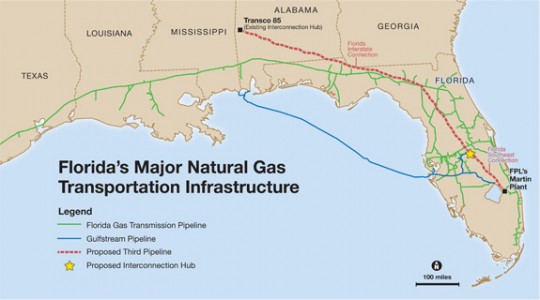Facebook has its moments when it’s a pain and other’s when it’s a HUGE help: an upcoming Facebook event has lots of Florida residents prepping to protest the Sabal Trail pipeline.
The event “Springs Not Pipelines! An Action Camp on the Santa Fe River” has so far reached over 900 people, with over 100 saying they will attend from Friday to Sunday on the Santa Fe River Basin (they are camping). For those who attend they will be teaching about the pipeline and what can be done to safely and peacefully protest its construction.
A recap about the project from the article:
“The Sabal Trail Project is a $3 billion project spanning 515-miles, which will run a pipeline through Alabama, Georgia and Florida in order to transport natural gas. Duke Energy and Florida Power and Light and others will use these resources to run plants that generate electricity for their customers, according to Andrea Grover, a Sabal Trail spokeswoman.
Grover said the natural gas traveling in the pipe would stay in a gaseous form with the help of five compression stations along the pipeline. So, if there were a leak, the natural gas would not contaminate the aquifers. Instead, the gas, being lighter than water and air, would dissolve into the atmosphere.”
(While the projected pipeline will have fail-safes, should there be a leak, any spark on the surface could ignite and cause an explosion.)
However, Sierra Club campaign organizer Merrillee Malwitz-Jipson, wonders why the pipeline is being built when the active compression gas pipelines we already have aren’t yet at full capacity. Especially given the location of the proposed pipeline: through the Suwannee River state park and the Suwannee River.
The Sabal Trail Project took three years to address environmental impacts of construction, paid geologists to map out safe pathways, and parallels existing pipelines, but most of those areas are karst regions (the soil is corrosive and is susceptible to sinkholes and fissures)- in fact, there are more than 3,000 entries of karst conditions along the path of the pipeline. And as if that isn’t bad enough, the Federal Energy Regulatory Commission and the U.S. Army Corps of Engineers didn’t do any third party testing. No worries though, the Federal Energy Regulatory Commission (they regulate U.S. interstate natural gas pipeline projects) signed off on permits to allow the Sabal Trail Project to start construction on February 2, 2016.
If you are in the area or are able to travel, consider joining the protest. We can no longer trust our government to care for and protect our environment. We must do it ourselves.
Source: WUFT











